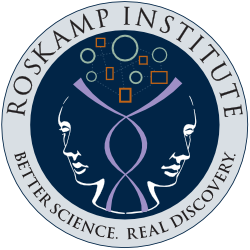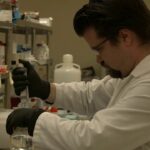A new partnership with NASA extends Roskamp’s field of operations to the International Space Station and beyond.
It’s not unusual for Roskamp Institute to work under strict confidentiality requirements – in fact, the capacity to accommodate complex project protocols has made Roskamp a leading research provider internationally, with hundreds of grants and contracts awarded. But of all the missions it has undertaken, Roskamp’s latest contract is perhaps the most exciting and adventurous. After months of working under a strict cloak of secrecy, The Roskamp Institute is proud to announce it is working with NASA to support projects on the International Space Station (ISS).
As our press release described it, The Roskamp Institute has become an Animal Care Facility for the National Aeronautics and Space Administration (NASA). On the International Space Station, astronauts experience a number of changes that could affect their health. Understanding these effects of microgravity and how to counteract them will be vital to a successful future for humans in space. The first mission in which the Roskamp Institute was involved launched rodents to the space station on December 6th, 2020, a mission successfully completed with the rodents’ return in January 2021. NASA has published a description of this experiment titled, “The Role of CDKN1a/p21 Pathway in Microgravity-Induced Bone Tissue Regenerative Arrest – A Spaceflight Study of Transgenic CDKN1a/p21-Null Mice in Microgravity” on its website.*
According to NASA, results from the experiment are expected to have applications both in space and on Earth, with a focus on preventing bone and tissue degeneration: “Results from this investigation provide evidence for how the CDKN1a/p21 pathway is modified by microgravity, and may be the basis for development of preventive treatments designed to counter tissue degeneration in space,” and “These results may lead to possible ways to treat or prevent bone loss caused by a number of regeneration-related diseases on Earth.”
A key element in the NASA contract award was Roskamp’s depth of experience in the tools and techniques of subject animal care. For several years now, NASA has been conducting rodent research in space, and Roskamp Institute is now providing support for such projects being carried out on the International Space Station. Working with model organisms such as rodents can help scientists gain insight into the likely effects of microgravity on the human body, and in this first NASA mission Roskamp assisted with preparation and training of the mice, as well as acclimating them to the special food, watering techniques, and habitat designs they will encounter at the ISS. Roskamp was also responsible for operating a ground control group of mice housed in simulated ISS conditions matched in areas of flight operations and husbandry, as well as a vivarium group housed under more standard laboratory conditions.
“In appreciation for your tireless support of Rodent Research-10 and Rodent Research-23 for the SpaceX-21 mission to the ISS. Roskamp is truly a member of the International Space Station Team.”
The contract with NASA calls for the Institute to support several missions per year over the next four years. The ability to integrate NASA project support into existing Institute research space and workflow was critical to the award, however new projects will require significant additions to Roskamp Institute’s facilities and personnel. Expansion plans now underway will add laboratory space to house more than 20 new research scientists and more than double the assessment and treatment capacity of Roskamp Clinic. For information on how you can get involved as a supporter of Roskamp Institute, please visit https://roskampinstitute.org/donate.
* NASA Experiment Link:
https://www.nasa.gov/mission_pages/station/research/experiments/explorer/Investigation.html?#id=7734



